113 books about Political Advocacy and 5
start with H
113 books about Political Advocacy and 5
113 books about Political Advocacy
5 start with H start with H
5 start with H start with H
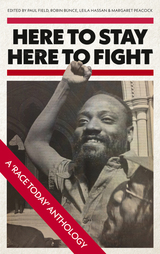
Here to Stay, Here to Fight
A Race Today Anthology
Paul Field
Pluto Press, 2019
From 1973 to 1988, Race Today, the journal of the revolutionary Race Today Collective was at the epicentre of the struggle for racial justice in Britain. Placing race, sex and social class at the core of its analysis, it featured in its articles and pamphlets contributions from some of the leading writers and activists of the time: C. L. R. James, Darcus Howe, Linton Kwesi Johnson, Toni Morrison, Maya Angelou, Walter Rodney, Bobby Sands, Farrukh Dhondy and Mala Sen and many more. Here to Stay, Here to Fight, draws together many of these key articles and extracts into an impressive collection - the first book-length anthology of its kind - rescuing many contributions from the obscurity of inaccessible archives. Framing the original contributions, there is a general introduction, which provides an overview of Race Today's 15-year history, section introductions providing context for each extract, written by writers and activists associated with the Collective, and a concluding section exploring the legacy of Race Today in contemporary social movements and debates around race, gender and class.
[more]
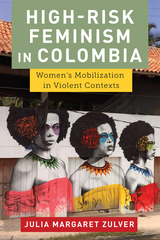
High-Risk Feminism in Colombia
Women's Mobilization in Violent Contexts
Julia Margaret Zulver
Rutgers University Press, 2022
High-Risk Feminism in Colombia documents the experiences of grassroots women’s organizations that united to demand gender justice during and in the aftermath of Colombia’s armed conflict. In doing so, it illustrates a little-studied phenomenon: women whose experiences with violence catalyze them to mobilize and resist as feminists, even in the face of grave danger. Despite a well-established tradition of studying women in war, we tend to focus on their roles as mothers or carers, as peacemakers, or sometimes as revolutionaries. This book explains the gendered underpinnings of why women engage in feminist mobilization, even when this takes place in a ‘domain of losses’ that exposes them to high levels of risk. It follows four women’s organizations who break with traditional gender norms and defy armed groups’ social and territorial control, exposing them to retributive punishment. It provides rich evidence to document how women are able to surmount the barriers to mobilization when they frame their actions in terms of resistance, rather than fear.
[more]
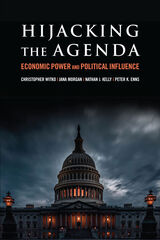
Hijacking the Agenda
Economic Power and Political Influence
Christopher Witko
Russell Sage Foundation, 2021
Why are the economic interests and priorities of lower- and middle-class Americans so often ignored by the U.S. Congress, while the economic interests of the wealthiest are prioritized, often resulting in policies favorable to their interests? In Hijacking the Agenda, political scientists Christopher Witko, Jana Morgan, Nathan J. Kelly, and Peter K. Enns examine why Congress privileges the concerns of businesses and the wealthy over those of average Americans. They go beyond demonstrating that such economic bias exists to illuminate precisely how and why economic policy is so often skewed in favor of the rich.
The authors analyze over 20 years of floor speeches by several hundred members of Congress to examine the influence of campaign contributions on how the national economic agenda is set in Congress. They find that legislators who received more money from business and professional associations were more likely to discuss the deficit and other upper-class priorities, while those who received more money from unions were more likely to discuss issues important to lower- and middle-class constituents, such as economic inequality and wages. This attention imbalance matters because issues discussed in Congress receive more direct legislative action, such as bill introductions and committee hearings. While unions use campaign contributions to push back against wealthy interests, spending by the wealthy dwarfs that of unions.
The authors use case studies analyzing financial regulation and the minimum wage to demonstrate how the financial influence of the wealthy enables them to advance their economic agenda. In each case, the authors examine the balance of structural power, or the power that comes from a person or company’s position in the economy, and kinetic power, the power that comes from the ability to mobilize organizational and financial resources in the policy process. The authors show how big business uses its structural power and resources to effect policy change in Congress, as when the financial industry sought deregulation in the late 1990s, resulting in the passage of a bill eviscerating New Deal financial regulations. Likewise, when business interests want to preserve the policy status quo, it uses its power to keep issues off of the agenda, as when inflation eats into the minimum wage and its declining purchasing power leaves low-wage workers in poverty. Although groups representing lower- and middle-class interests, particularly unions, can use their resources to shape policy responses if conditions are right, they lack structural power and suffer significant resource disadvantages. As a result, wealthy interests have the upper hand in shaping the policy process, simply due to their pivotal position in the economy and the resulting perception that policies beneficial to business are beneficial for everyone.
Hijacking the Agenda is an illuminating account of the way economic power operates through the congressional agenda and policy process to privilege the interests of the wealthy and marks a major step forward in our understanding of the politics of inequality.
The authors analyze over 20 years of floor speeches by several hundred members of Congress to examine the influence of campaign contributions on how the national economic agenda is set in Congress. They find that legislators who received more money from business and professional associations were more likely to discuss the deficit and other upper-class priorities, while those who received more money from unions were more likely to discuss issues important to lower- and middle-class constituents, such as economic inequality and wages. This attention imbalance matters because issues discussed in Congress receive more direct legislative action, such as bill introductions and committee hearings. While unions use campaign contributions to push back against wealthy interests, spending by the wealthy dwarfs that of unions.
The authors use case studies analyzing financial regulation and the minimum wage to demonstrate how the financial influence of the wealthy enables them to advance their economic agenda. In each case, the authors examine the balance of structural power, or the power that comes from a person or company’s position in the economy, and kinetic power, the power that comes from the ability to mobilize organizational and financial resources in the policy process. The authors show how big business uses its structural power and resources to effect policy change in Congress, as when the financial industry sought deregulation in the late 1990s, resulting in the passage of a bill eviscerating New Deal financial regulations. Likewise, when business interests want to preserve the policy status quo, it uses its power to keep issues off of the agenda, as when inflation eats into the minimum wage and its declining purchasing power leaves low-wage workers in poverty. Although groups representing lower- and middle-class interests, particularly unions, can use their resources to shape policy responses if conditions are right, they lack structural power and suffer significant resource disadvantages. As a result, wealthy interests have the upper hand in shaping the policy process, simply due to their pivotal position in the economy and the resulting perception that policies beneficial to business are beneficial for everyone.
Hijacking the Agenda is an illuminating account of the way economic power operates through the congressional agenda and policy process to privilege the interests of the wealthy and marks a major step forward in our understanding of the politics of inequality.
[more]
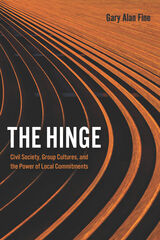
The Hinge
Civil Society, Group Cultures, and the Power of Local Commitments
Gary Alan Fine
University of Chicago Press, 2021
Most of the time, we believe our daily lives to be governed by structures determined from above: laws that dictate our behavior, companies that pay our wages, even climate patterns that determine what we eat or where we live. In contrast, social organization is often a feature of local organization. While those forces may seem beyond individual grasp, we often come together in small communities to change circumstances that would otherwise flatten us. Challenging traditional sociological models of powerful forces, in The Hinge, Gary Alan Fine emphasizes and describes those meso-level collectives, the organizations that bridge our individual interests and the larger structures that shape our lives. Focusing on “tiny publics,” he describes meso-level social collectives as “hinges”: groups that come together to pursue a shared social goal, bridging the individual and the broader society. Understanding these hinges, Fine argues, is crucial to explaining how societies function, creating links between the micro- and macro-orders of society. He draws on historical cases and fieldwork to illustrate how these hinges work and how to describe them. In The Hinge, Fine has given us powerful new theoretical tools for understanding an essential part of our social worlds.
[more]
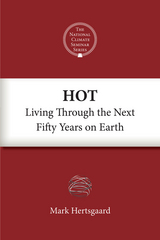
Hot
Living Through the Next Fifty Years on Earth
Mark Hertsgaard
Island Press, 2012
On December 7, 2011, Mark Hertsgaard participated in The National Climate Seminar, a series of webinars sponsored by Bard College’s Center for Environmental Policy. The online seminars provide a forum for leading scientists, writers, and other experts to talk about critical issues regarding climate change. The series also opens a public conversation, inviting participants to ask questions and contribute their own thoughts.
Hertsgaard has spent the last two decades reporting on climate change for media outlets including The New Yorker, NPR, Time, Vanity Fair, and The Nation, where he is the environment correspondent. His lecture focused on political movements and how environmental advocates can provoke change in public attitudes and on Capitol Hill. Hertsgaard sees 2011’s Occupy movement as a sign of real hope and discussed what climate activists can learn from Occupy’s tactics.
This E-ssential is an edited version of Hertsgaard’s talk and the subsequent question and answer session. While some material has been cut and some language modified for clarity, the intention was to retain the substance of the original discussion.
Hertsgaard has spent the last two decades reporting on climate change for media outlets including The New Yorker, NPR, Time, Vanity Fair, and The Nation, where he is the environment correspondent. His lecture focused on political movements and how environmental advocates can provoke change in public attitudes and on Capitol Hill. Hertsgaard sees 2011’s Occupy movement as a sign of real hope and discussed what climate activists can learn from Occupy’s tactics.
This E-ssential is an edited version of Hertsgaard’s talk and the subsequent question and answer session. While some material has been cut and some language modified for clarity, the intention was to retain the substance of the original discussion.
[more]
READERS
Browse our collection.
PUBLISHERS
See BiblioVault's publisher services.
STUDENT SERVICES
Files for college accessibility offices.
UChicago Accessibility Resources
home | accessibility | search | about | contact us
BiblioVault ® 2001 - 2024
The University of Chicago Press









